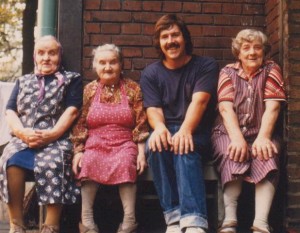No, I'm not talking about the Idol judges. I'm talking about writers. You know the type: rodomontading, bombastic raconteurs, forever gasconading with big fancy words.
Thankfully, I'm not like that (as you can tell!). But it's not because I haven't tried. I just couldn't get away with it. Let me tell you what I mean.
 I was in Poland in my early days as a smuggler behind the old Iron Curtain. The East German guards had reluctantly allowed our car past, having looked in every imaginable hiding place with sniffer dogs and mirrors on long handles. Finding nothing, they had waved us on. It was a warm, Indian summer day and I was bringing hard currency for the support of a contact.
I was in Poland in my early days as a smuggler behind the old Iron Curtain. The East German guards had reluctantly allowed our car past, having looked in every imaginable hiding place with sniffer dogs and mirrors on long handles. Finding nothing, they had waved us on. It was a warm, Indian summer day and I was bringing hard currency for the support of a contact.
After making our delivery, I paid a visit to a retirement home. It was more of an institution. A dilapidated old house with barrels outside where sauerkraut was prepared. The place was full of lonely old people. Much like today. Shuffled off to some other place so as not to interfere in the lives of their kids. Through translators, I spent a few wonderful hours chatting about our favorite topic: food. Not surprisingly, no one mentioned the sauerkraut.
 I then had the privilege of attending a children's camp in a neighboring village. Ranging between the ages of nine and fourteen, the children spoke no English except for a beaming young boy named Norbert, who ran up to me yelling, "Pizza ... Mickey Mouse ... Disneyland!" That was the extent of his English. He gave me a hug and called his friends over. His friends all hugged me and began talking in rapid Polish. They were wonderful kids: generous and giving and honest in their affection, as kids usually are.
I then had the privilege of attending a children's camp in a neighboring village. Ranging between the ages of nine and fourteen, the children spoke no English except for a beaming young boy named Norbert, who ran up to me yelling, "Pizza ... Mickey Mouse ... Disneyland!" That was the extent of his English. He gave me a hug and called his friends over. His friends all hugged me and began talking in rapid Polish. They were wonderful kids: generous and giving and honest in their affection, as kids usually are.
The town where the camp was located had a dilapidated train station that saw an old steam engine hiss to a stop twice a week with its string of sooty carriages. Huge trees shaded streets of broken pavement, and along each side were large three-story houses with louvered shutters, slate roofs and crumbling plaster walls. Years of war and Soviet occupation had been hard on the people. No one could afford the upkeep. Coal was the main source of heating. The air smelled of it. Food was also scarce. Bread lines were more common than bread.
 But these hardships did not dampen the spirits of the children, who were singing happily as we walked to the station to watch the train arrive. It was the way kids hung out together in a country without shopping malls.
But these hardships did not dampen the spirits of the children, who were singing happily as we walked to the station to watch the train arrive. It was the way kids hung out together in a country without shopping malls.
The station itself was an old wooden structure with scalloped trim. Once grand and picturesque, it was rundown like everything else. With the smell of coal heavy in the air, we marched up the ramp and onto the concrete platform as the train ground to a stop. Passengers paused to look at the music and laughter filling the air.
We approached an old woman with a wooden push cart piled high with strawberries and cherries. She was bent over with age and wore a faded floral dress. She had a bandana tied over her hair. The kids pooled their meager savings and bought two small paper sacks bulging with fruit. I offered to buy each of them a sack but they wouldn't hear of it. Nor would they permit me to buy a sack for myself. Instead, they then offered me some of theirs. Over twenty kids sharing two small sacks of fruit.
I will never forget the magnificent taste of that fruit. Or those children that taught me so much about generosity and happiness. The joy for those kids wasn't in getting everything they wanted. The joy for them was in sharing.
 Meals for the camp were furnished by a local restaurant. Breakfast consisted of a huge pot of spaghetti boiled in milk. Lunch was a huge pile of sandwiches made of dense bread and homemade jam. Dinner was chicken and vegetables. Remember, these were Iron Curtain days and food was both scarce and expensive. The East Bloc existed purely for the benefit of the Soviet Union, which took the best of everything Poland (and other occupied Eastern European countries) had to offer. I have personally stood in a bread line for over three hours, starting before dawn, in order to buy our rationed loaf of bread. On a train, I once gave a small "brick" of coffee to a woman. She grabbed me in a tearful hug and said, "This would have cost me two month's salary."
Meals for the camp were furnished by a local restaurant. Breakfast consisted of a huge pot of spaghetti boiled in milk. Lunch was a huge pile of sandwiches made of dense bread and homemade jam. Dinner was chicken and vegetables. Remember, these were Iron Curtain days and food was both scarce and expensive. The East Bloc existed purely for the benefit of the Soviet Union, which took the best of everything Poland (and other occupied Eastern European countries) had to offer. I have personally stood in a bread line for over three hours, starting before dawn, in order to buy our rationed loaf of bread. On a train, I once gave a small "brick" of coffee to a woman. She grabbed me in a tearful hug and said, "This would have cost me two month's salary."
 Dinner the first day consisted of chicken breast and vegetables. On the second day, we had chicken thighs and vegetables. On the third day, we had chicken wings and vegetables. And on the fourth day, we had what was left over -- chicken intestines and vegetables.
Dinner the first day consisted of chicken breast and vegetables. On the second day, we had chicken thighs and vegetables. On the third day, we had chicken wings and vegetables. And on the fourth day, we had what was left over -- chicken intestines and vegetables.
Yes, chicken intestines. They had been prepared in a sweet and sour sauce in order to masquerade the taste of intestine, not to mention the gelatinous giblet paste that had been packed inside them. It looked terrible. It smelled revolting.
But I wasn't about to let these kids see me as a spoiled Westerner. No way. I was a Cool Dude Writer. I knew big words. I could eat anything and not complain. So I dug in and made a big deal of how much I loved the meal.
"Ummm, yum," I moaned with mock delight while nodding and smacking my lips.
I could see the kids watching me carefully while they picked at their vegetables. Vegetables only, mind you -- while ignoring the intestines -- which should have been a major clue. But I was oblivious to the clue because I was so focused on letting them know how cool I was.
I sliced off more bites - "Ummm, yum," I exclaimed while washing them down with the artificially brilliant yellow drink we had been given.
Suddenly, nearly every kid at the table began scraping their sweet-and-sour intestines onto my plate. "I'm not eating this stuff," they all began saying. The translaters, who interpreted for me, howled with laughter at the shocked look on my face.
Yes, those kids taught me a valuable lesson: don't try to be someone you're not.
So you see: being a know-it-all Cool Dude Writer isn't something I'm very good at. Someone always discovers the truth. My abruptly grounded ego notwithstanding, I have never eaten chicken intestines since.

